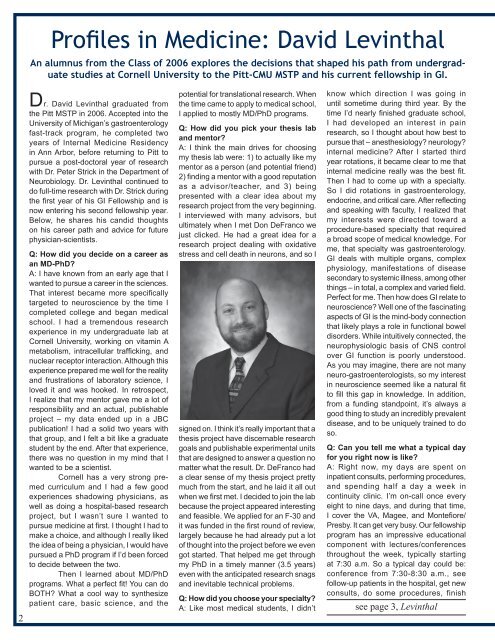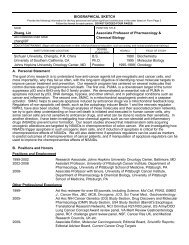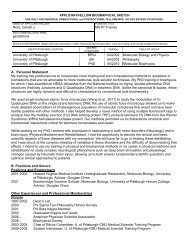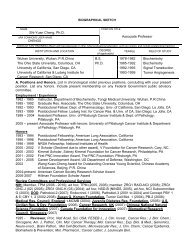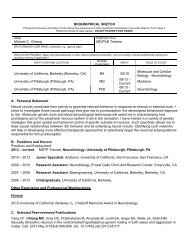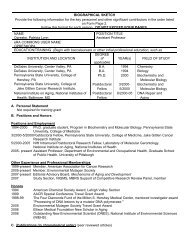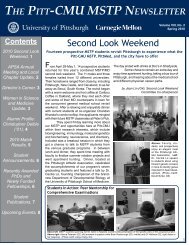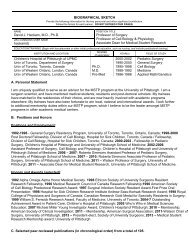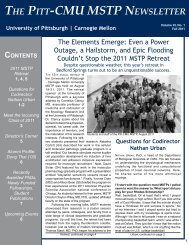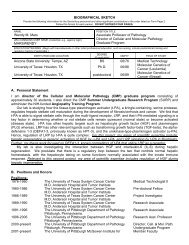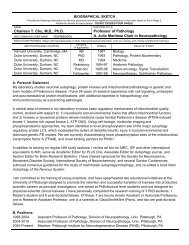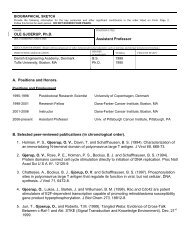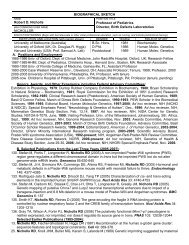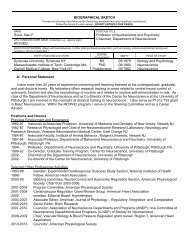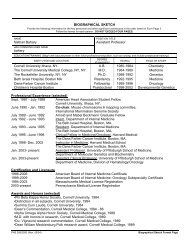The PiTT-CMU MSTP NewSleTTer - University of Pittsburgh :: MSTP
The PiTT-CMU MSTP NewSleTTer - University of Pittsburgh :: MSTP
The PiTT-CMU MSTP NewSleTTer - University of Pittsburgh :: MSTP
You also want an ePaper? Increase the reach of your titles
YUMPU automatically turns print PDFs into web optimized ePapers that Google loves.
Pr<strong>of</strong>iles in Medicine: David Levinthal<br />
An alumnus from the Class <strong>of</strong> 2006 explores the decisions that shaped his path from undergraduate<br />
studies at Cornell <strong>University</strong> to the Pitt-<strong>CMU</strong> <strong>MSTP</strong> and his current fellowship in GI.<br />
2<br />
Dr. David Levinthal graduated from<br />
the Pitt <strong>MSTP</strong> in 2006. Accepted into the<br />
<strong>University</strong> <strong>of</strong> Michigan’s gastroenterology<br />
fast-track program, he completed two<br />
years <strong>of</strong> Internal Medicine Residency<br />
in Ann Arbor, before returning to Pitt to<br />
pursue a post-doctoral year <strong>of</strong> research<br />
with Dr. Peter Strick in the Department <strong>of</strong><br />
Neurobiology. Dr. Levinthal continued to<br />
do full-time research with Dr. Strick during<br />
the first year <strong>of</strong> his GI Fellowship and is<br />
now entering his second fellowship year.<br />
Below, he shares his candid thoughts<br />
on his career path and advice for future<br />
physician-scientists.<br />
Q: How did you decide on a career as<br />
an MD-PhD?<br />
A: I have known from an early age that I<br />
wanted to pursue a career in the sciences.<br />
That interest became more specifically<br />
targeted to neuroscience by the time I<br />
completed college and began medical<br />
school. I had a tremendous research<br />
experience in my undergraduate lab at<br />
Cornell <strong>University</strong>, working on vitamin A<br />
metabolism, intracellular trafficking, and<br />
nuclear receptor interaction. Although this<br />
experience prepared me well for the reality<br />
and frustrations <strong>of</strong> laboratory science, I<br />
loved it and was hooked. In retrospect,<br />
I realize that my mentor gave me a lot <strong>of</strong><br />
responsibility and an actual, publishable<br />
project – my data ended up in a JBC<br />
publication! I had a solid two years with<br />
that group, and I felt a bit like a graduate<br />
student by the end. After that experience,<br />
there was no question in my mind that I<br />
wanted to be a scientist.<br />
Cornell has a very strong premed<br />
curriculum and I had a few good<br />
experiences shadowing physicians, as<br />
well as doing a hospital-based research<br />
project, but I wasn’t sure I wanted to<br />
pursue medicine at first. I thought I had to<br />
make a choice, and although I really liked<br />
the idea <strong>of</strong> being a physician, I would have<br />
pursued a PhD program if I’d been forced<br />
to decide between the two.<br />
<strong>The</strong>n I learned about MD/PhD<br />
programs. What a perfect fit! You can do<br />
BOTH? What a cool way to synthesize<br />
patient care, basic science, and the<br />
potential for translational research. When<br />
the time came to apply to medical school,<br />
I applied to mostly MD/PhD programs.<br />
Q: How did you pick your thesis lab<br />
and mentor?<br />
A: I think the main drives for choosing<br />
my thesis lab were: 1) to actually like my<br />
mentor as a person (and potential friend)<br />
2) finding a mentor with a good reputation<br />
as a advisor/teacher, and 3) being<br />
presented with a clear idea about my<br />
research project from the very beginning.<br />
I interviewed with many advisors, but<br />
ultimately when I met Don DeFranco we<br />
just clicked. He had a great idea for a<br />
research project dealing with oxidative<br />
stress and cell death in neurons, and so I<br />
signed on. I think it’s really important that a<br />
thesis project have discernable research<br />
goals and publishable experimental units<br />
that are designed to answer a question no<br />
matter what the result. Dr. DeFranco had<br />
a clear sense <strong>of</strong> my thesis project pretty<br />
much from the start, and he laid it all out<br />
when we first met. I decided to join the lab<br />
because the project appeared interesting<br />
and feasible. We applied for an F-30 and<br />
it was funded in the first round <strong>of</strong> review,<br />
largely because he had already put a lot<br />
<strong>of</strong> thought into the project before we even<br />
got started. That helped me get through<br />
my PhD in a timely manner (3.5 years)<br />
even with the anticipated research snags<br />
and inevitable technical problems.<br />
Q: How did you choose your specialty?<br />
A: Like most medical students, I didn’t<br />
know which direction I was going in<br />
until sometime during third year. By the<br />
time I’d nearly finished graduate school,<br />
I had developed an interest in pain<br />
research, so I thought about how best to<br />
pursue that – anesthesiology? neurology?<br />
internal medicine? After I started third<br />
year rotations, it became clear to me that<br />
internal medicine really was the best fit.<br />
<strong>The</strong>n I had to come up with a specialty.<br />
So I did rotations in gastroenterology,<br />
endocrine, and critical care. After reflecting<br />
and speaking with faculty, I realized that<br />
my interests were directed toward a<br />
procedure-based specialty that required<br />
a broad scope <strong>of</strong> medical knowledge. For<br />
me, that specialty was gastroenterology.<br />
GI deals with multiple organs, complex<br />
physiology, manifestations <strong>of</strong> disease<br />
secondary to systemic illness, among other<br />
things – in total, a complex and varied field.<br />
Perfect for me. <strong>The</strong>n how does GI relate to<br />
neuroscience? Well one <strong>of</strong> the fascinating<br />
aspects <strong>of</strong> GI is the mind-body connection<br />
that likely plays a role in functional bowel<br />
disorders. While intuitively connected, the<br />
neurophysiologic basis <strong>of</strong> CNS control<br />
over GI function is poorly understood.<br />
As you may imagine, there are not many<br />
neuro-gastroenterologists, so my interest<br />
in neuroscience seemed like a natural fit<br />
to fill this gap in knowledge. In addition,<br />
from a funding standpoint, it’s always a<br />
good thing to study an incredibly prevalent<br />
disease, and to be uniquely trained to do<br />
so.<br />
Q: Can you tell me what a typical day<br />
for you right now is like?<br />
A: Right now, my days are spent on<br />
inpatient consults, performing procedures,<br />
and spending half a day a week in<br />
continuity clinic. I’m on-call once every<br />
eight to nine days, and during that time,<br />
I cover the VA, Magee, and Montefiore/<br />
Presby. It can get very busy. Our fellowship<br />
program has an impressive educational<br />
component with lectures/conferences<br />
throughout the week, typically starting<br />
at 7:30 a.m. So a typical day could be:<br />
conference from 7:30-8:30 a.m., see<br />
follow-up patients in the hospital, get new<br />
consults, do some procedures, finish<br />
see page 3, Levinthal


